A gay old time in Paestum
After a couple of days in Salerno, it was time to spread our wings and venture out. Our new maps and bus schedules in hand, we considered our options.
“There’s Paestum,†suggested the Ant.
Now, I’m basically tagging along on this portion of the trip, so I’ve done embarrassingly little research into the area. I’d never even heard of Paestum. So I picked up my handy-dandy tourist guide and learned a couple of fun facts about Paestum. First, Paestum has the largest collection of Greek temples outside of Greece. Coolness. My family is Greek and Italian. We’re other things, too, but we mostly claim the Greek and Italian. This sounded like our kind of place.
Second, I learned that Paestum was deserted when most of the population was wiped out by mosquitoes carrying malaria. That’s much of the reason the temples remain intact. Not good. But not surprising.
The Ant and I had spent the first two nights battling insane mosquito-like beasts. These things were big. I could hear them winging their way toward my headlamp each night while I was reading Pema Chodron and trying to find a little peace. An interesting challenge.
And they did something funny to our skin.
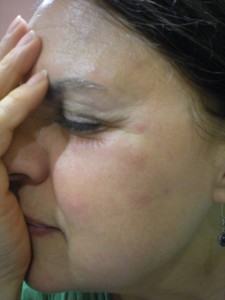
This is two days after the Ant was bitten about 6 times on the side of her face. I was bitten, I believe, 3 times on the ear, (it was hard to tell how many times, due to the intense swelling and redness) and it’s still itching, 2 weeks later. At least the open wound has healed up. The 20 or so other bites on my face and legs never really took hold. I’ve just been considering this training for Survivor. Regardless, these things are bad news.
Brimming with understanding of our Greek/Roman mosquito-bate ancestors, we hopped a bus to Paestum. That’s Pa-ace-toom. Get it right. Or the bus driver will act like he doesn’t understand where you’re trying to go. Then he’ll correct your pronunciation. Or maybe that was just my experience.
I sat in my seat, going over it in my head: “pa-ace-toom, pa-ace-toom, pa-ace-toom.â€Â I’d have to ask him later if we were getting close.
We scuttered along through town after town, noting the differences in the styles of apartment buildings, or the way people hung their laundry.
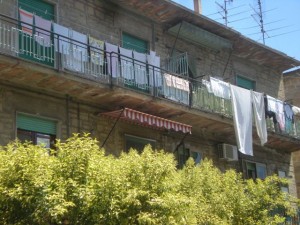
The country got wilder, and more open and we wondered how much further. Passengers ebbed and flowed along the winding track we took to the ruins. Tourists, workers, grandmothers, coming and going between the villages.
We saw a municipal sign of some sort. “Welcome to Paestum†or something similar. When we’re traveling by bus, there’s often not much to tell us where we are, other than signs on buildings. If we miss the sign at the beginning of a town, we could go the entire length of the town without having a clue where we are. This big sign for Paestum was more than we usually get. We grabbed our bags and jumped up, moving forward several rows to make sure the bus driver could see us. When the bus stopped, he signaled to us. “No.â€Â We weren’t there yet? Wow. Our fool-proof method had failed us. How many stops could there be in Paestum?
20 minutes later, we were still driving. Whoops! I was starting to like our bus driver more and more.
I consulted the pages I’d torn from my trusty Rick Steves book; we tried to find our location on the Ant’s smart phone. No use. Rick said the bus would let us off outside the old city walls. I peeled my eyes and kept them on the horizon for city walls of some kind.
When we finally rumbled up to a lonely gelato shop at the intersection of two country roads, I was a little surprised to hear the driver bellow, “Pa-ace-toom!†and wave us forward.
“Qua?â€Â I wanted to make sure. “Pa-ace-toom.â€Â He just nodded again, but this time smiled.
“Ciao, grazie!â€Â we smiled as we climbed off alone.
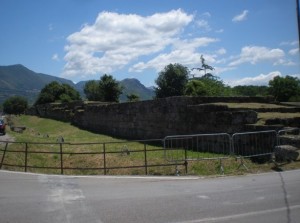
The city walls were there, low, thick, and old. We smiled at the folks under big umbrellas outside the gelato shop, and walked inside the ancient city walls.
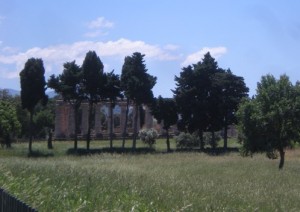
“That’s a good sign,†I said, jerking my head in the direction of the trees and columns.
We located the ticket office, purchased our combo ticket for the temples and the museum, and headed out into the fenced field bordered by vendors selling trinkets.
We spent the next two hours walking through the tall, flowing grasses, looking up at the temples.
It’s amazing how much I find myself affected by places like this. I find I could sit on a hunk of rock and contemplate my ancestors for hours, days, ever maybe.
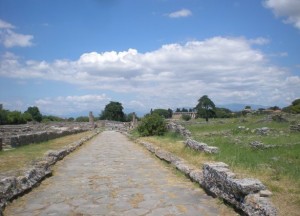
The Ant read a sign about the destructive lichen eating away the ruins, and decided she’d come back with a toothbrush to volunteer her time and rid the temples of the beast. I thought it was pretty.
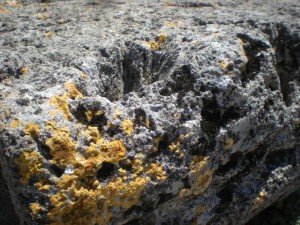
As we walked, we talked absentmindedly about the Greeks and their superiority, and I thought about the first time I’d seen Greek ruins up close. It was on a trip to Greece with my family when I was a teenager. We were looking for family, but taking in some sights along the way. I spent the day at Olympus with my dad, Greek grandfather, and uncle. I remember clearly the feeling of disgust I had for the people of Greece. How could they let their precious temples be ruined like this? Why didn’t they stand the columns back up?
Hilarious.
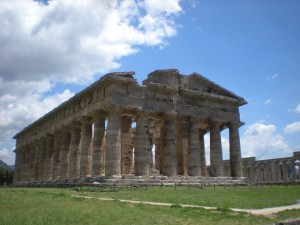
In Paestum, I was amazed at how intact the temples were. So much so that we could do side-by-side comparisons of architectural changes over 500 years. Brilliant.
At the end of two hours of strolling and thinking in the sun, we were starving. It was most assuredly time for pizza. After a ridiculous episode whereby we unknowingly tried to enter a restaurant from the back side, left in a bit of a huff, walked 4 blocks and unwittingly ended up entering the same restaurant from the correct direction, we were seated with 2, count them 2, huge bottles of water in front of us.
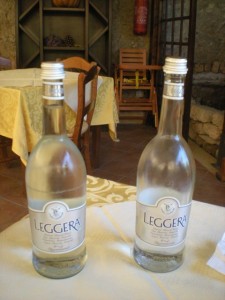
Note: the Ant and I carry our own water bottles with us wherever we go. By this time we had consumed every drop. The only way to really get water in a restaurant in Italy is to buy it. From a bottle. Or to fill in the restroom, which we do regularly. Today, we bought water.
On our first attempt to enter the restaurant, we’d spotted a menu and scoped out the pizzas. We already had our favorites picked out: cherry tomatoes and rocket for the Ant, squash blossom for me.
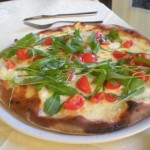
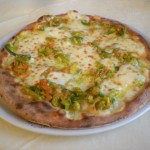
One bottle of water already in our stomachs, we scarfed these heavenly pizzas down. Most pizzas come served whole in Italy, with a knife and fork. You get to cut to size and eat however you see fit. Some people cut pieces and eat with their hands. Some cut slices and then cut them into smaller pieces to eat with a fork. Others eat the center, and leave the crust (I consider this a great crime). On days like today, we start with big pieces folded and stuffed in our faces, then cut smaller and smaller pieces, packing the dough and cheese in.
Whatever water was left, we poured into our empty bottles and prepared for the second half of the day:Â the museum.
The second great historical site at Paestum is the tomb of the diver. Dating back to the Greeks, this sarcophagus is rare, maybe unique in its preservation (thanks, mosquitos). The insides of the box were painted with scenes to entertain the dead. The lid of this one was painted with an image of a diver, gracefully leaping from a great height into the unknown, a peaceful look and feel about him.
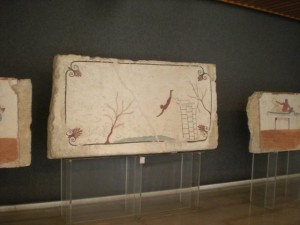
The walls of the box were painted with scenes from a party. A very festive party. Perhaps even a very gay party…
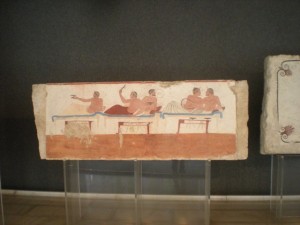
As we stood and looked at the panels, a tour group of British school-kids came through with a tour guide. I stood nearby to catch a free lesson.
“The panels depict a typical party. The first man sits on a sofa, beckoning for more wine, waiting in anticipation. The second grouping shows two men playing a game in which a plate is balanced on a stick, and the last drop of wine is flicked from the glass in an attempt to hit the plate, knocking it to the floor.â€
He paused.
“The third group shows one man playing an instrument, and engaged in a show of affection,†another pause, “more than just enjoying each other’s company.â€Â The kids looked closer. The guide continued:
“Now I’m not one to say whether this is a scene of homo-eroticism, but that is the prevailing view of the experts.† I chuckled a little. The musician was all but pinching the other guy’s nipple. Maybe I should consider a career in ancient Greek art.
Feeling like we should make use of our museum tickets, we cruised through, checked out the super-old bronze vases, and penis-shaped pots. Gay.
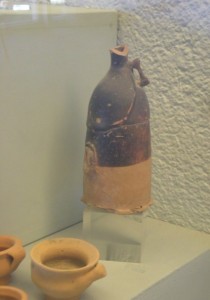
Leaving the museum, we praised the gods and goddesses for the lack of present-day mosquitoes in Paestum. We’d commune with our ancestors later. For me, I’d found other connections with my ancient brothers and sisters. Any people who celebrated ceramic sexuality, squash-blossoms, and leaps into the unknown were my people.
June 18, 2010 1 Comment
Yasou!
I am exactly 1/8 Greek. I was brought up, however, approximately 120% Greek and 110% Italian, depending on the day. You see, the Greeks invented math, so we get to change the rules.
My grandfather is 1/2 Greek, but I think he’s pretty much all Greek. Because his mom was from France, he wasn’t allowed to attend the Greek Orthodox church, or the Greek School at the church. Well, they let him attend, but they wouldn’t speak Greek to him. So, he is still making up for it.
When I was a kid, my mother made amazing Greek food. We had a small group of Greek folks in our town of 3000. That meant that the neighbors would show up to summer bbq’s with tiropita (cheese pies), and there was a Greek festival at the local Greek restaurant. Yummy. My dad would wear a funny hat that had a Greek soldier and the word “Yasou!” on it. Yasou means literally, God is great, and is used as a type of greeting. I can still hear “Yasou” hurled through the air as friends joined the festival.
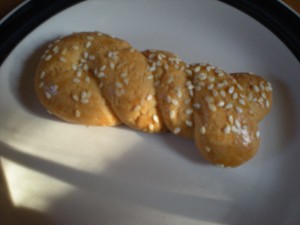
When I moved to Portland for college, I had no idea there was a rather large Greek community here. Every year when the leaves start to change, I start getting excited for the Portland Greek Festival. It’s held every October on the grounds of Holy Trinity Greek Orthodox Church. Being away from home, the festival always makes me feel better. When I’m there, I’m not the only one with bushy eyebrows or big hair. I don’t have the huskiest voice, and I’m not the only one gesturing wildly. In fact, I’m pretty mild in comparison. (I know, hard to believe.)
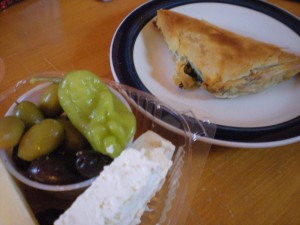
Today, I’m sitting in front of the computer eating leftovers from the festival (a first – I can’t remember ever having leftovers), and remembering the olive-pit-spitting contest from the little festival in Ketchum Idaho. I’m also wondering if the next time I have Greek food it will be in Greece, and whether it will be at the Plaka in Athens, or a little village on an island. It makes me giggle. Yasou! indeed.
October 7, 2009 6 Comments
Nostradin
My grandfather celebrated his 89th birthday last weekend. 89. Wow.
My grandfather is many things. He is a Pear Harbor Survivor and a carpenter. He loves trains. He makes train whistles and turtle-stools, and all manner of fabulous things.  He is a tinkerer and creator of the highest order.  He is Greek and French, though the Greek is the part we really talk about. He is even a past master of the Masons. Most of all, he is a story-teller.
He has a story for EVERYTHING. Sometimes he has two or three stories. (For example, there are 2 stories that are told every time we eat asparagus. ) Once in a great while, he comes up with a new one that my sister and I haven’t heard – probably becaue we’re now old enough to hear the more racey ones. Those are always excellent.
My favorites, and I think his, are folk stories he must have heard growing up, of a man called Nostradin Hodja.
As an adult I learned that “Hodja” means “Mullah,” but to me, it was his last name. The stories are a kind of mix of fable and dirty limerick, usually showing Nostradin as a fool. I always saw him as a kind of uncle, and the stories of my grandfather’s making. Maybe 15 years ago, my grandfather made recordings of the recited stories in his own voice. They are gems. I remember spending hours with him on his computer making a drawing of Nostradin in Microsoft Paint for the cassette jacket cover.
So, in honor of my grandfather, here is one of my favorite Nostradin stories. This is one of two stories that is told in my family whenever someone spills food on themselves.
‘There was a great feast happening in the village where Nostradin Hodja lived. Everyone in the village was preparing the town square. There would be very important dignitaries at the feast, and Nostradin was excited to get to meet them.
When the time came for him to go to the feast, he got dressed and entered the town square. Everyone from the village was there. There were beautiful high tables set on a stage above the villagers, where the dignitaries were seated. As he approached the high tables, Nostradin was stopped by attendants and told that he could sit in the lower tables with the other villagers.
Well, this did not suit Nostradin at all. He gazed at the dignitaries dressed in their fine silk robes and fancy turbins. He looked down at his rough wool tunic and felt his ordinary fez. “I know!” cried Nostradin, and he rushed from the square.
When he arrived home, he found his finest silk robes and grandest turbin. He even put on his shoes that turned up at the toes, and set off toward the square once again.
This time, when he approached the high tables, he was greeted by the attendants who welcomed him to sit with the dignitaries.
He enjoyed a lovely feast of roast lamb, rosemary potatoes, glittering fruits and the finest wines – all in the company of the dignitaries.
At the end of the feast, Nostradin took some food from his plate and began rubbing it on his robes, in his turbin, and even across his shoes that turned up at the toes. “Nostradin! What are you doing?!” cried one of the attendants. “Well,” said Nostradin, “it is these clothes that got me my seat at the feast, and they should enjoy the feast as much as I!”‘
Ask me some time and I’ll tell you the other story for when you spill food on yourself.
Thanks Grandpa! Happy Birthday!
August 6, 2009 2 Comments


